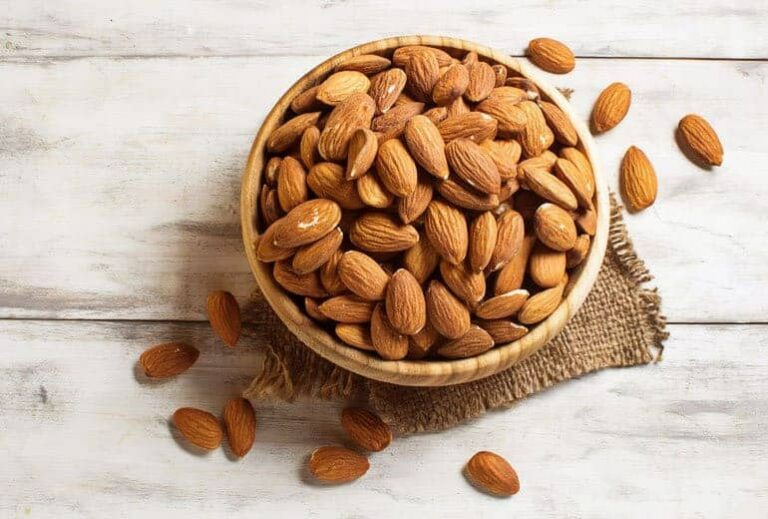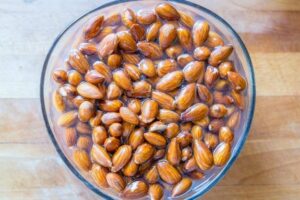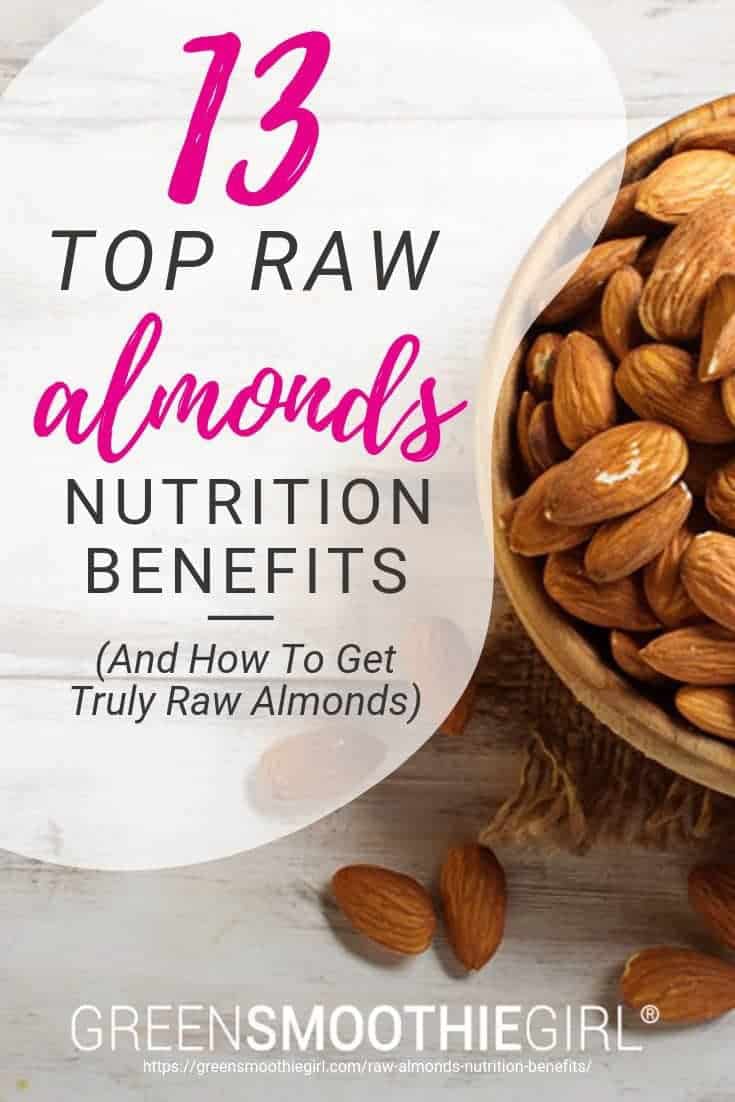13 Top Raw Almonds Nutrition Benefits (And Why You Want Truly Raw Almonds)

Truly Raw Almonds: The Unpasteurized Healthy Snack!
The most potent nutrition benefits and best taste come from truly raw almonds.
But unless you have a direct connection to an almond grower (and we do!), truly raw almonds are impossible to buy because of regulations that require pasteurization and fumigation of any quantity over 100 pounds.
[Raw, high-quality nuts are one of the healthiest ways to boost your health all year. Truly raw, delicious almonds from our CA rancher friend are included in our 2-week-only Nut Group Buy, going on now!]
In this article:
- Why Does it Matter if Almonds are “Truly Raw”?
- Why Should You Soak and Sprout Raw Almonds?
- How Do You Sprout Almonds?
- 13 Top Raw Almonds Health Benefits
- Always Buy Raw Almonds
- How Long Do Almonds Keep, and How Should I Store Them?
Why Does it Matter if Almonds are “Truly Raw”?
California has forced almond growers to pasteurize all their nuts above 130 degrees.
This steam process not only blunts the almond flavor, but it also kills enzymes, which are destroyed at 118-120 degrees.
Pasteurized "raw" nuts
But since there is no legal definition of “raw” when it comes to food, retailers can sell pasteurized almonds and still call them “raw almonds,” because they aren’t roasted, not because they are actually raw!
Raw almonds have live enzymes
Pasteurized almonds are “dead” and won’t sprout!
You want truly raw almonds for their superior taste, live enzymes, and so you can soak and sprout them.
Why Should You Soak and Sprout Raw Almonds?

When you soak raw almonds for 12-24 hours, they germinate and become a living superfood.
These amazing health benefits happen when you sprout almonds:
- Enzymes Multiply. The water signals to the almond (which is actually a seed rather than a nut) that it's time to grow. To grow, seeds have to turn off their natural enzyme inhibitors and rapidly increase the enzymes needed to sustain a growing plant. These enzymes then become available to your body when you eat sprouted almonds, improving your digestion and other bodily processes.
- Minerals and Vitamins Increase. This is especially true for B vitamins. Growing plants need B vitamins and their mineral partners to metabolize carbohydrate for energy, which also means that when the almonds are soaked or sprouted, these vitamins and minerals become available for our body to absorb.
- Carbs Decrease. Seeds are their own energy source, and they use their carbohydrates to produce the energy they need to sprout.
- Oxalates are Reduced. People who are sensitive to oxalates can enjoy more raw almonds simply by sprouting them!
- Bioavailable Nutrients are Unlocked. Amino acids and other nutrients “unlock.” They become more numerous and bioavailable.
- Improved Taste. A sprouted almond has an even more nutty, almondy taste than the raw version. If you’ve been eating pasteurized almonds (which you almost certainly have, since raw almonds take effort to find), you are missing out on taste!
How Do You Sprout Almonds?

Raw almonds need about 12 hours of soaking in water, at room temperature, to start the sprouting process; I usually soak mine overnight. You don’t have to soak them long enough to see the nub of the sprout poking through the skin (that would take days, and often the nut will mold first). Just be sure to give the almonds at least 12 hours in the water. Remember, pasteurized almonds won’t sprout, no matter how long you soak them!
I recommend dehydrating them below 116 degrees to preserve all the enzymes.
The Uses of Sprouted Almonds
Sprouted almonds can be used to make almond milk or in almond recipes, or preserved, live enzymes intact, by drying them in a dehydrator for several hours at 110 degrees.
I’ve got a bunch of yummy recipes for you to try with your sprouted almonds when you join one of our Group Buys!
13 Top Raw Almonds Nutrition Benefits
Sprouted or not, the nutrition benefits of almonds are fantastic:
1. Keeps You Full Longer
A serving of raw almonds (one ounce, or about 23 almonds) has 160 calories, 6 grams of protein, 3.5 grams of fiber, and 14 grams of heart-healthy fats.
A great snack that can sustain you for hours!
2. Lowers Cholesterol
Almonds are famously high in monounsaturated fat, the LDL-lowering fat associated with heart health.
A study published in the American Journal of Clinical Nutrition found almonds, when substituted for more traditional fats, can reduce cholesterol levels as much as first-generation statin drugs!1
3. Drastically Reduces Heart Disease Risk
Researchers from the Nurses’ Health Study (one of the largest longitudinal health studies ever) estimate that replacing nuts for an equivalent amount of carbs cuts heart disease risk by 30%.2
Even more impressive results come when substituting nuts like almonds for saturated fat (as in dairy and meat); the disease risk goes down 45%!
4. Keeps Your Blood Pressure Steady
Almonds have a great electrolyte balance, with 162 mg potassium and just .2 mg of sodium per serving.
The high potassium-to-sodium ratio lowers blood pressure by drawing more fluid out of the bloodstream and into the cells.
5. Prevents Muscle Spasms and Cramping
High magnesium and potassium in almonds keep blood and oxygen moving to muscles and help regulate the electrical signals that contract those muscles.
They also help blood vessels and muscles relax, so oxygen and other nutrients can feed cells and prevent cramping.
6. Reduces Diabetes Risk
Meals featuring almonds have been shown to cut surges in blood sugar, as well as increase antioxidants. Both factors are important in preventing and controlling diabetes.
7. Protects Skin, Organs, and Connective Tissues
If you’re struggling with skin ailments, eating almonds regularly might help, because they have the most vitamin E, which protects skin cells from the damaging effects of pollution, UV rays, smoke, and other factors. Almond oil has been a treasured skin protectant and moisturizer for millennia.
In 50 postmenopausal women, eating almonds daily for 16 weeks reduced wrinkle severity, in a 2019 study published in Phytother Research.3
8. Slows Aging
Along with Vitamin E, researchers have found that almonds have a unique combination of bioflavonoids, particularly in their brown skins.4
The synergistic effect of the flavonoids with Vitamin E serves to prevent cellular damage and help cells regenerate and repair quickly.
9. Gives You Energy

Cellular energy production requires trace mineral “triggers,” such as copper and manganese, which are found abundantly in almonds. The B vitamins and antioxidants C and E also assist in energy production.
The even better news is that sprouting raw almonds greatly multiplies the amount of all these nutrients!
10. Helps You Lose Weight
Many people avoid nuts for fear of weight gain, which turns out to be baseless.
A study comparing overweight people eating a low-calorie, high-complex-carbohydrate diet, vs. those eating a low-calorie, almond-rich diet, showed the almond-eaters to have a 56% greater reduction in body fat, 50% greater reduction in waist circumference, and a 62% greater reduction in overall weight!2
Other studies have shown that people who eat nuts like almonds twice a week are less likely to gain weight than those who never eat them.5
11. Helps Prevent Gallstones
The Nurses’ Study showed that women who ate just 1 ounce of nuts per week (just 28 almonds!) lowered their risk of gallstone formation by 25%.6
12. Mops Up Free Radicals
The high percentage of the antioxidant vitamins E and C are natural free radical scavengers, reducing inflammation and preventing DNA damage to cells and tissues.
13. Encourages Healthier Eating
A year-long study found that people eating 2 ounces of almonds every day (and given no other guidelines) naturally gravitated toward eating more nutrient-dense foods, and fewer nutrient-poor, high-sugar foods.7
Always Buy Raw Almonds

Every year, we give our community an affordable way to get truly raw, sproutable almonds direct and fresh from the grower, during our Group Buys.
You can freeze any almonds you won’t be using in a few weeks, and still keep their live nutrients intact. Get enough to last you the year!
How Long Do Almonds Keep, and How Should I Store Them?
Almonds harvest only once a year, so whenever and wherever you buy them throughout the year, they will be from this same fall crop.
They may keep 9-12 months in the pantry, but if you would like to keep them as fresh as possible, refrigerate them in tightly sealed bags or jars for 18-24 months, or freeze them indefinitely. They will still germinate (sprout and unlock enzyme potential after soaking) after freezing with very little loss of nutrition.
Then, if you know you’ll be using them tomorrow, just soak them today, and overnight! Then drain and use. This will 2X to 10X virtually all nutrients, and unlock the enzymes.
Don't miss our Nut Group Buy, going on now — because supplies are limited at this price!
Read Next: Almond Flour Crust | Health Benefits of Pecans — So Much More Than A Sugary Indulgence!

Disclosure: This post may contain affiliate links that help support the GSG mission without costing you extra. I recommend only companies and products that I use myself.

Sources
- Jenkins DJ, Kendall CW, Marchie A, Faulkner DA, Wong JM, et al. Direct comparison of a dietary portfolio of cholesterol-lowering foods with a statin in hypercholesterolemic participants. Am J Clin Nutr. 2005 Feb;81(2):380-7. 2005. PMID:15699225.
- Wien MA, Sabate JM, Ikle DN, Cole SE, Kandeel FR. Almonds vs complex carbohydrates in a weight reduction program. Int J Obes Relat Metab Disord. 2003 Nov;27(11):1365-72. 2003.
- Rybak, I., Carrington, A. E., Dhaliwal, S., Hasan, A., Wu, H., Burney, W., Maloh, J., & Sivamani, R. K. (2021). Prospective Randomized Controlled Trial on the Effects of Almonds on Facial Wrinkles and Pigmentation. Nutrients, 13(3), 785. https://doi.org/10.3390/nu13030785
- Chen CY, Milbury PE, Lapsley K, Blumberg JB. Flavonoids from almond skins are bioavailable and act synergistically with vitamins C and E to enhance hamster and human LDL resistance to oxidation. J Nutr. 2005 Jun;135(6):1366-73. 2005. PMID:15930439.
- Bes-Rastrollo M, Sabate J, Gomez-Gracia E, Alonso A, Martinez JA, Martinez-Gonzalez MA. Nut consumption and weight gain in a Mediterranean cohort: The SUN study. Obesity (Silver Spring). 2007 Jan;15(1):107-16. 2007. PMID:17228038.
- Tsai CJ, Leitzmann MF, Hu FB, Willett WC, Giovannucci EL. Frequent nut consumption and decreased risk of cholecystectomy in women. Am J Clin Nutr. 2004 Jul;80(1):76-81. 2004. PMID:15213031.
- Jaceldo-Siegl K, Sabate J, Rajaram S, Fraser GE. Long-term almond supplementation without advice on food replacement induces favourable nutrient modifications to the habitual diets of free-living individuals. Br J Nutr. 2004 Sep;92(3):533-40. 2004. PMID:15469659.
Posted in: Health Concerns, Preparedness, Whole Food















